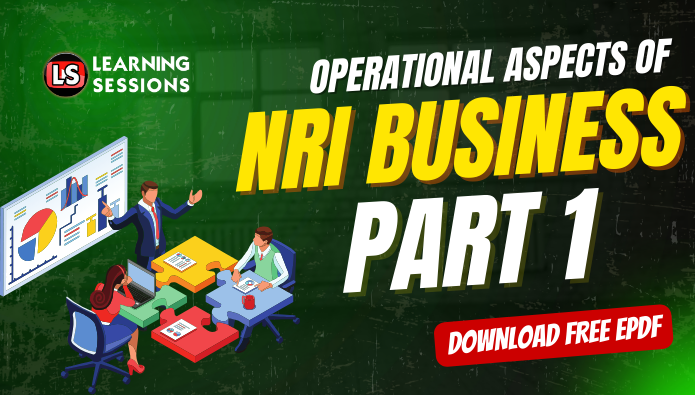Have you ever wondered how NRI banking works? What are the different types of accounts NRIs can open in India? How are FEMA guidelines applied to NRI deposits? If you’re a banking professional preparing for the JAIIB exam, understanding NRI banking is crucial!
In this video, we cover Chapter 9 from the Principles & Practices of Banking (Module A), focusing on operational aspects of NRI banking. We break down:
📚 JAIIB Study Resources 📚
👉 Check Here
👉 Check Here
👉 Check Here
👉 Get Tests Here
👉 Check Here
- Types of NRI Accounts (NRE, NRO, FCNR)
- FEMA guidelines for foreign exchange transactions
- Permitted transactions, joint accounts & taxation
- Loan facilities and repatriation rules
- Key exam-oriented points
If you’re a banker, finance student, or JAIIB aspirant, this guide will help you master NRI banking concepts with ease. So, watch the full video and don’t forget to drop your questions in the comments!
Watch the Full Video
👉 Before we dive in, watch this video for a complete breakdown:
Understanding NRI Banking – A Detailed Breakdown
📌 FEMA Guidelines & RBI’s Role (00:01:04)
The Foreign Exchange Management Act (FEMA) replaced FERA to regulate foreign exchange transactions. Under FEMA, RBI has the power to:
- Regulate & restrict foreign exchange transactions
- Define rules for NRI deposits
- Prohibit certain transactions involving foreign exchange
RBI closely monitors the inflow and outflow of foreign currency in India. FEMA guidelines help ensure that transactions remain within the country’s financial regulations, reducing the risks associated with money laundering and unregulated financial activities.
📌 Types of NRI Accounts & Their Features (00:02:06)
NRIs have different options for managing their finances in India. The three primary types of accounts available to them are:
1️⃣ NRE Account (Non-Resident External)
- Maintained in Indian Rupees
- Fully repatriable (principal + interest)
- Tax-free interest
- Can be opened as savings, current, fixed deposit
- Joint accounts allowed with another NRI or Resident Indian (on Former-Survivor basis)
This type of account is best for NRIs who wish to park their foreign earnings in India while maintaining repatriability.
2️⃣ NRO Account (Non-Resident Ordinary)
- Maintained in Indian Rupees
- Used to manage local income (rent, dividends, pensions)
- Interest is taxable
- Limited repatriation (up to $1 million per financial year)
The NRO account is useful for NRIs who earn income within India and need a local account for transactions.
3️⃣ FCNR Account (Foreign Currency Non-Resident)
- Maintained in foreign currency (USD, GBP, EUR, etc.)
- Only Fixed Deposits allowed (tenure 1-5 years)
- Fully repatriable (principal + interest)
- Tax-free interest in India
FCNR accounts help NRIs hold deposits in foreign currency, minimizing risks related to exchange rate fluctuations.
[FREE EPDF] JAIIB PPB | Financial Inclusion | Module A Chapter 16
Conclusion: Key Takeaways & Next Steps
✅ NRE, NRO, and FCNR accounts have different tax, withdrawal, and repatriation rules.
✅ NRIs must comply with FEMA & RBI regulations for managing funds in India.
✅ Loans can be taken against NRI deposits, but with restrictions.
✅ Taxation differs between NRE (tax-free), NRO (taxable), and FCNR (tax-free).
If you found this guide useful, like the video, drop your questions in the comments, and subscribe for more JAIIB exam content! 🚀
📥 Download PDF Notes
Click here to download the PDF notes





